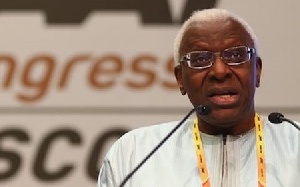The head of world athletics has admitted the sport faces "a crisis" over allegations of doping by Russian competitors.
Speaking to the BBC, Lamine Diack, president of the International Association of Athletics Federations (IAAF) said: "It's a difficult crisis but we will put it behind us by cleaning all this."
In December, a German TV documentary claimed Russian officials systematically accepted payment from athletes to supply banned substances and cover up tests.
In his first broadcast interview since the allegations were made public, Diack said he was "shocked" and "disturbed" when he first heard the claims.
But the 81-year-old Senegalese official insisted allegations that 99% of Russian athletes are doping were "a joke" and "ridiculous".
"I cannot accept that somebody came and said in Russia it's 99% cheating. It's not true," he said.
"I understand after this kind of crisis, people are saying 'OK, what are they doing, is it right or not?', but I think we have to be absolutely clear that our athletes are 90% to 95% clean."
German television station WDR broadcast three documentaries alleging that IAAF officials were implicated in covering up doping in Russia.
Those claims are now being examined by the IAAF's ethics commission, which will decide whether Russian anti-doping officials, its own treasurer and even the son of its president are guilty of wrongdoing.
But Diack - who will stand down as IAAF president in August after 16 years as the most powerful figure in track and field - denied knowledge of any cover-up.
"I'm convinced I know my department. I know how they work very, very hard about the fight against doping, and I didn't see any reason to make a cover-up of a doping case," he said.
Athletics has a chequered history of drug scandals, from East Germany's years of state-imposed blanket doping, through to the Bay Area Laboratory Co-Operative (Balco) affair. However, it was one of the first sports to introduce the biological passport.
These latest claims of widespread wrongdoing stem principally from former Russian Anti-Doping Agency (Rusada) official Vitaly Stepanov and his wife Yulia (nee Rusanova), formerly an 800m runner who was banned for doping.
They allege that leading Russian athletics officials supplied banned substances in exchange for 5% of an athlete's earnings and colluded with doping control officers to hush up and falsify tests.
The BBC has not independently verified the documentary's allegations and is awaiting responses from the athletes, who were approached when it was first broadcast, that were targeted in the programme. The Russian authorities have dismissed the allegations as a "pack of lies".
However, the scandal has threatened to engulf athletics, and Diack must now try to restore the sport's credibility and reputation.
"We face a difficult situation in Russia... we have to clean up what is going on in Russia now," he said.
"OK, in Russia there are some cheaters and if it's demonstrated that cheating is organised we have to take action, not only on the athletes, but on the leaders.
"It's our job to clean all this and take all the measures we have to take.
"It's a crisis, absolutely. We have to put this behind us but we will arrive to make it.
"You cannot leave any doubt about our results. If we come to a situation where people are saying 'what they are doing is not true', what then? So we have to clean."
Out of 37 athletes sanctioned under the IAAF's biological passport programme since 2009, 23 are Russian. In January, Russia's anti-doping agency banned five race-walkers, including three Olympic champions. Russia's athletics head coach Valentin Maslakov has resigned.
The first of the three documentaries made allegations against Massata Papa Diack, the son of president Diack and a marketing consultant for the governing body, and Valentin Balakhnichev, the IAAF treasurer and Russian Athletics Federation president
They stepped down from their posts following a meeting of the IAAF's executive board.
Balakhnichev described the allegations as a "pack of lies" and pledged to return to his post at "the end of the investigation".
Fifty-year-old Papa Massata Diack - one of Diack senior's 15 children - has denied involvement with a company alleged to be complicit in covering up doping, but has admitted to business links with its owner.
The Guardian has also reported that he apparently requested a $5m payment from Qatar during the race for the 2017 World Athletics Championships.
He denies making such a request on behalf of the IAAF and says no payment was ever received.
The Qatar Athletics Federation told The Guardian it did not recognise emails the newspaper referred to and had complied with all regulations.
"A father is not happy to see his son accused of that, but I am sure that he will clear his name", said IAAF president Diack, who rejected suggestions that his son's position raises questions over a conflict of interest.
The World Anti-Doping Agency (Wada) has also launched an investigation into the claims, in which unnamed British athletes have also been implicated.
WDR alleged the IAAF failed to follow up on suspicious blood tests between 2001 and 2008 from more than 150 athletes, including a top athlete from Britain - who cannot be named for legal reasons.
Diack has dismissed this as "ridiculous", insisting IAAF officials would not know whether follow-up tests had been conducted, and that its athlete biological passport scheme was only launched in 2009.
The IAAF has added that pre-2009 samples were only used as "secondary evidence", or to trigger follow-up urine tests "whenever possible logistically".
Meanwhile, Diack said he has full confidence in the IAAF's ethics commission, chaired by Michael Beloff QC, which is expected to conclude its investigation by spring.
"Absolutely. I selected some wonderful people, that nobody can doubt are absolutely independent," he said.
Track & Field News of Tuesday, 17 February 2015
Source: BBC

















